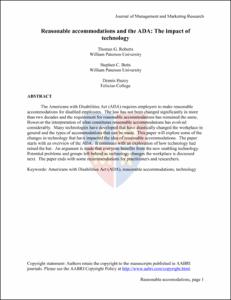Please use this identifier to cite or link to this item:
http://hdl.handle.net/20.500.12164/135| Title: | Reasonable accommodations and the ADA: The impact of technology |
| Authors: | Roberts, Thomas G. Betts, Stephen C. Huzey, Dennis |
| Keywords: | Americans with Disabilities Act (ADA);Reasonable Accomodations;Technology;Business |
| Issue Date: | 2014 |
| Publisher: | Academic and Business Research Institute |
| Citation: | Roberts, T.G., Betts, S.C. & Huzey, D. (2014) ‘Reasonable Accommodations and the ADA: The Impact of Technology’, Journal of Management and Marketing Research, 15, pp. 1-8. |
| Abstract: | The Americans with Disabilities Act (ADA) requires employers to make reasonable accommodations for disabled employees. The law has not been changed significantly in more than two decades and the requirement for reasonable accommodations has remained the same. However the interpretation of what constitutes reasonable accommodations has evolved considerably. Many technologies have developed that have drastically changed the workplace in general and the types of accommodations that can be made. This paper will explore some of the changes in technology that have impacted the idea of reasonable accommodations. The paper starts with an overview of the ADA. It continues with an exploration of how technology had raised the bar. An argument is made that everyone benefits from the new enabling technology. Potential problems and groups left behind as technology changes the workplace is discussed next. The paper ends with some recommendations for practitioners and researchers. |
| URI: | http://www.aabri.com/manuscripts/131737.pdf http://hdl.handle.net/20.500.12164/135 |
| ISSN: | 2157-0205 |
| Appears in Collections: | Business |
Files in This Item:
| File | Description | Size | Format | |
|---|---|---|---|---|
| 131737.pdf | article | 164.03 kB | Adobe PDF |  View/Open |
Items in DSpace are protected by copyright, with all rights reserved, unless otherwise indicated.
